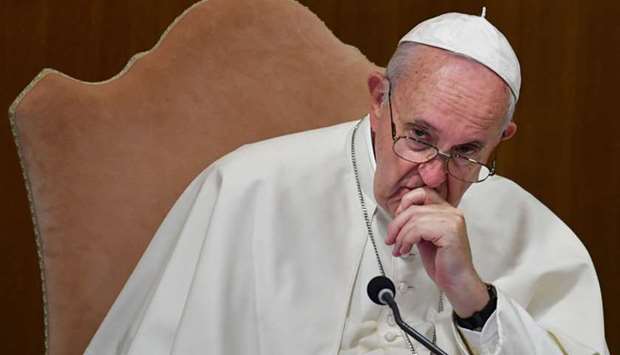Pope Francis stepped up his battle against corruption in the Vatican yesterday with a new law aimed at boosting transparency in tenders and cutting costs as a post-coronavirus recession hits.
Convicted mobsters and those guilty of tax fraud are among a list of undesirables now unable to pocket contracts.
The Argentine Pontiff was elected in 2013 to put the Vatican’s finances in order, but has met resistance from certain ministries reluctant to relinquish control over funds or shine a light on internal workings.
An Apostolic Letter and 30 pages of new norms released yesterday are the culmination of a four-year process to rationalise spending procedures and tackle nepotism and cronyism.
The document was the result of years of work co-ordinated by the State Secretariat, in which many organs of the Roman Curia had also participated, including the Economic Council, the Vatican said.
The code is due to come into force 30 days after yesterday’s publication.
Pope Francis wants to commit his administration to lower spending and transparency.
“The diligence of a good family father is the general principle,” he began in his personal Apostolic Letter, a so-called motu proprio. “The global economy and increased interdependence have brought to the fore the possibility of achieving significant cost savings through the work of multiple suppliers of goods and services.”
Good management of public goods, requires “faithful and honest administration”, the head of the Catholic Church said.
Principles such as “transparency, control and competition in the procedures” are at the centre of the extensive set of rules.
They come as the coronavirus pandemic has wreaked havoc with the Vatican’s finances, forcing it to implement some of the toughest cost-control measures ever.
In his letter, Francis said the new norms would allow for “a considerable reduction in the danger of corruption”.
The new rules mandate highly detailed, transparent procedures for awarding contracts for goods and services.
It is “not an insignificant turn of events”, Vatican expert Iacopo Scaramuzzi said on Twitter.
“It puts an end to the firmly established Vatican habit ... of entrusting external contracts to relatives and friends of friends,” he added.
Most Vatican contracts are with Italian companies.
Documents leaked during the pontificate of Francis’s predecessor, pope Benedict XVI, showed that a Vatican department paid an Italian construction company an exorbitant amount to build a nativity scene in St Peter’s Square.
The new standards of “transparency, control and competition in the procedures for awarding public contracts” will centralise expenditures, currently very fragmented, under two administrative bodies.
The changes will “significantly reduce the danger of corruption”, Francis said in his written introduction to the law.
While the days of suspected mafia involvement in the Vatican’s finances are long gone, the seat of the Catholic Church has found it difficult to shake off scandals completely.
A recent investigation uncovered possible corruption linked to Vatican real estate investments in London.
As well as excluding people convicted of ties to organised crime groups from bids, the law says the Vatican’s selection for tenders must comply with ethical principles and avoid conflicts of interest.
Giuseppe Pignatone, a leading Italian anti-mafia expert who was appointed by the Pope in October to head up the Vatican’s court, said that the law is aimed at achieving “significant savings” through competitive bidding.
“The theme of cutting expenses is very topical and important at this time – unfortunately destined to continue – of serious economic difficulties for the whole world, but also for the Holy See and the Vatican City State,” he said.
Professor Vincenzo Buonomo, rector of the Pontifical Lateran University, told the official Vatican News website that this measure would help eliminate favouritism, and ensure fair competition and economy of scale.
Vatican sources have said that in the past, for example, they had to buy office supplies from a firm that had been used for years even though they were available for cheaper elsewhere.
Buonomo said the new norms would bring the Vatican into full compliance with the United Nations’ Merida Convention against corruption, which the Holy See signed in 2016.

Pope Francis: The diligence of a good family father is the general principle.
